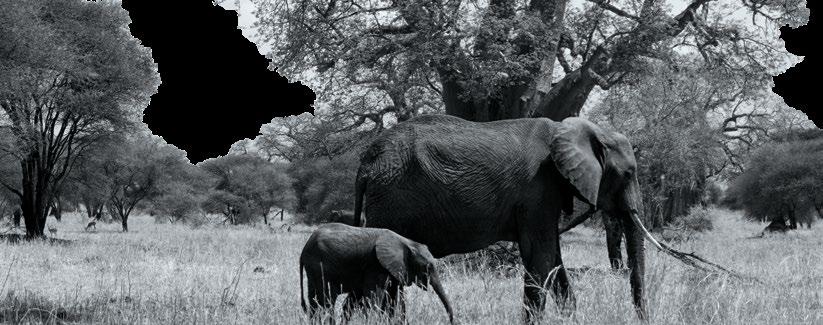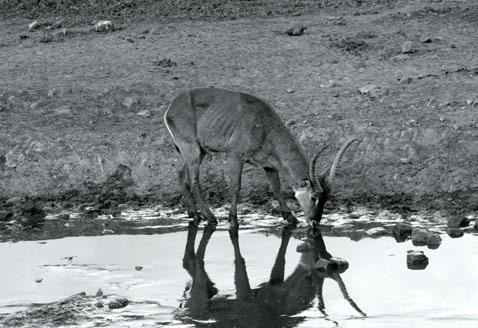
4 minute read
UNEARTHING TANZANIA’S PLIGHT AGAINST CLIMATE CHANGE
By Zac Mcmenemy
My lights have flickered out. Another electricity blackout. For me, a student on Manchester Met’s African Wildlife Ecology and Conservation course taught in Tanzania, this power loss means a few hours without wi-fi. Although this is a minor inconvenience for me, the increasingly unreliable energy supply is indicative of a much more concerning reality for Tanzania.
Advertisement
The Intergovernmental Panel on Climate Change (IPCC) reports that current temperatures are at least 1⁰C above pre-industrial levels, and are expected to rise rapidly over the coming decades, with the world’s poorest populations forecast to be hardest hit. Tanzania is already feeling the heat.
“Climate change is a real thing and in Tanzania, as one of the developing countries, we are affected by it – it is severe,’’ says Dr. Gabriel Mayengo, a lecturer at the College of African Wildlife Management (CAWM).
“We are experiencing irregular climatic conditions,” he continues. “We can vividly see the impact in our communities.”
The World Bank predicts further temperature rises of 2⁰C in as little as 20 years, which they warn could lead to food shortages, ecological disasters and economic depressions. The forecasts are bleak: more droughts and flash flooding across Africa, and the loss of up to 80% of land used for crops.
The threats posed to agriculture are particularly worrying to Tanzanians. Lazaro, a student at CAWM, told me how his father, a rice farmer, has struggled over the past year, with the price of rice doubling as climatic conditions became less favourable.
‘’People are closing down,” says Lazaro, a fate he fears may await his father.
These anxieties are endured across the nation. The most recent Intergovernmental Panel on Climate Change report highlights a 34% drop in agricultural productivity growth in Africa since 1961. As a direct result of climate change, this figure is only expected to grow, leaving people wondering how they will put food on the table.
Dr. Mayengo attributed this decline to irregular weather patterns. The disruption to the rainy/dry season regime affects not only agriculture, but all aspects of life in Tanzania. I had presumed, perhaps ignorantly, that the electricity blackouts that frequented Mweka, the village I am staying in on the slopes of Kilimanjaro, were commonplace.
Dr. Mayengo explains that these were virtually non-existent as little as a year ago. “Most of the rivers that used to be the main source of hydro-electric power have dried up and it has become a challenge to generate enough electricity,” he says.
He remains optimistic though, noting new government initiatives to tackle “the electricity problem”’ but these may involve an increased dependence on fossil fuels, thereby feeding a vicious cycle.
Tanzania’s wildlife is crucial to global conservation as well as vital to the country’s economy through tourism revenue. It remains one of the world’s most biodiverse countries, but many species that call the East African country home already find themselves listed as endangered on the ‘red list’ compiled by the International Union for Conservation of Nature (IUCN).
Potentially devastating consequences await if temperatures rise by 1.5°C, with the Intergovernmental Panel on Climate Change forecasting a 30% loss of all species. Lazaro, who is passionate about the natural world, admits he is “very, very worried, because we will lose a lot of species”.
Tanzania boasts the largest area of protected land in Africa, including vast unfenced national parks. With conditions deteriorating in the parks, animals have sought refuge elsewhere.

“Animals don’t have borders,” says Lazaro. In search of water and food, they are moving into farmlands and other areas, increasing conflict between humans and wildlife. Dr. Mayengo says this was previously not the case and that, with threats to local livelihoods and wildlife at risk, opposition towards conservation is rising.
The true travesty in all of this however, is how little Tanzania and Africa as a whole have contributed to the horrors that are bedevilling the continent. According to a report by the environmental impact charity CDP, Africa contributes 3.8% of all global greenhouse gas emissions, but has been forced to deal with the worst of the impacts of climate change.

Dr. Mayengo echoes this. While his country makes only a minimal contribution to global emissions, he says, “we are highly impacted”. Lazaro too is frustrated: “We are receiving a
Dr. Mayengo had this message for governments of polluternations: “You just emit and then you refuse to assist the fight against climate change. I think that’s not fair, for the present and for future generations.” He urges these governments to consider climate change in policy so that his compatriots could “live peacefully, like they used to.”
While Africa is badly hit by the consequences of climate change, the continent gets little help in coping with the aftermath. The IPCC reports that Africa received just 3.8% of global funding for climate-related research. This alarming statistic further illustrates the neglect shown towards the ‘Mother Continent’.
Notwithstanding the drastic impact of climate change on their lives, Tanzanians do not shy away from taking action. Lazaro urges his country to “do more conservation, more education and to have discipline […] to not over-exploit,” he says.
“By doing that here and globally, we will be in a position to solve the challenges that are now facing Tanzania.”
Despite this optimism, there is a growing sense that the issues beginning to plague Tanzania are out of its control, and that even organisations highlighting climate change and its consequences for local populations, such as the IPCC and the World Bank, cannot agree on a consistent approach. They advocate for change but rather than call for global solutions, they recommend adaptive action within the countries worst affected.
Dr. Mayengo describes the countries contributing most heavily to climate change as “selfish” and doubts the willingness of polluternations to make the changes needed. He is proud of his country in this David versus Goliath style fight, pointing to reforestation programmes by Tanzania’s Forest Services and National Park Authority but he concedes these are short-term approaches. Like Lazaro, he calls for the world to recognise the problems and identify solutions – or watch the lights go out completely.

